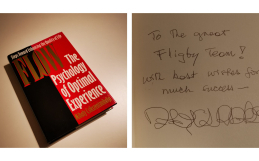Three Surprising Facts You Didn’t Know About The Father of Flow
Honoring an Extraordinary Life
Today, on what would be Professor Mihaly Csikszentmihalyi’s birthday, we celebrate not only a pioneering psychologist but also a truly adventurous spirit. Best known for his groundbreaking concept of Flow— that state of deep, effortless immersion in activities— Csikszentmihalyi changed the way we understand happiness, creativity, and the pursuit of meaningful work. His influential books, such as Flow: The Psychology of Optimal Experience, Creativity: Flow and the Psychology of Discovery and Invention, and Good Business: Leadership, Flow, and the Making of Meaning, have motivated millions to pursue richer, more fulfilling lives.
Although many imagine a professor’s life as quiet, spent behind books and lecterns, Csikszentmihalyi’s journey was anything but ordinary. His story is full of unexpected twists, daring escapes, and bold intellectual quests.
In this spirit, let’s dive into three facts you may not know about Prof. Csikszentmihalyi, celebrating not just his academic achievements but also the adventurous life that shaped the legend.
Fact 1: A Close Call with History and Penicillin
During World War II, young Mihaly Csikszentmihalyi, along with his mother and sister, fled the besieged city of Budapest by train, seeking refuge in Venice. They arrived at the Venice train station just as Allied forces launched a bombing raid. The station’s large glass canopy shattered, sending massive shards crashing down. Eleven-year-old Mihaly was seriously injured in the leg by falling glass. The wound became infected, and his survival was uncertain—until he became one of the earliest recipients of penicillin at a military hospital. This groundbreaking antibiotic saved his life, allowing him to grow up and later revolutionize our understanding of happiness and creativity.
Fact 2: Martians and a Life-Changing Lecture in Switzerland
In the early 1950s, young Mihaly Csikszentmihalyi faced significant hardships. Working multiple jobs just to support himself and his family, he worked tirelessly. Eventually, as a night porter at a hotel, he saved enough money to go on a skiing trip to Switzerland. But when he arrived, he was disappointed—the snow had melted, and he had no funds left for other entertainment. Then, he saw a flyer advertising a free lecture on UFOs. Thinking it would be an interesting break, he attended—and it turned out to be a turning point in his life. The lecture wasn’t about little green aliens but about how people project their fears and anxieties onto the UFO phenomenon. The speaker? None other than the legendary psychologist Carl Jung. This experience motivated Csikszentmihalyi to dedicate his life to studying human psychology, setting him on the path to his future breakthroughs.
Fact 3: Super Bowl and the Unexpected Bestseller
The original Flow book was written at the urging of American literary agent John Brockman, although Csikszentmihalyi himself doubted that the topic would ever gain mainstream attention. Published in 1990, the book initially received modest recognition—far from making the bestseller lists. Then, in 1993, something extraordinary happened. During the live broadcast of the Super Bowl halftime show, Dallas Cowboys coach Jimmy Johnson was asked how he prepared his team for the championship game. Johnson held up a copy of Flow to the camera and said, “I can’t pronounce the guy’s name who wrote this, but the boys are playing in Flow. And that’s why they’re going to win.” He was right—the Cowboys won, and the next day, every copy of Flow sold out across the country. Practically overnight, Csikszentmihalyi’s book became a huge bestseller, earning him not only professional recognition but also financial success for his pioneering work.
Beyond his groundbreaking research, Mihaly Csikszentmihalyi’s life offers powerful lessons in perseverance, commitment, and a genuine love for work. His journey shows us that success and fulfillment don’t come from talent alone—they require dedication and passion. Yet, as his story also reveals, luck plays a role in life’s unfolding. Mihaly’s experiences—from surviving a wartime injury thanks to penicillin to being inspired by a chance lecture and witnessing his work embraced in the most unexpected ways—remind us that fortune often meets preparation in remarkable ways.
His life is a testament to how adventure, resilience, and a bit of serendipity together shape not just a career, but a meaningful existence.





